Please Take Note: This is a review of the final game, but it might change slightly based on the success of the Kickstarter campaign. The game is being reviewed on the components and the rules provided with the understanding that “what you see is not what you might get” when the game is published. If you like what you read and want to learn more, we encourage you to visit the game publisher’s website or visit the Kickstarter campaign. Now that we have all that disclaimer junk out of the way, on with the review.
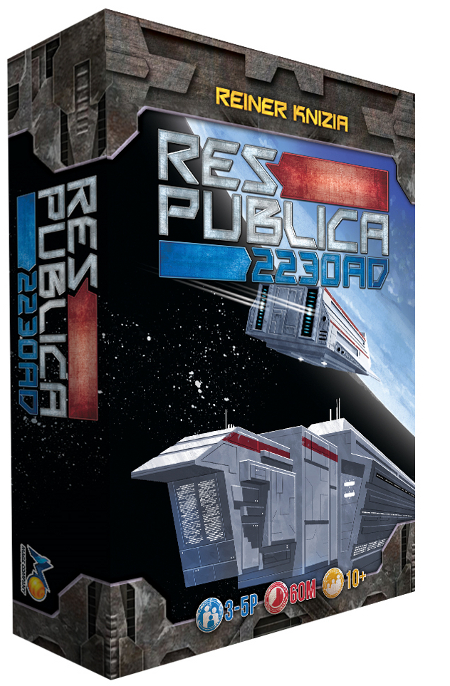
The Basics:
- For ages 8 and up (publisher suggests 10+)
- For 3 to 5 players
- Approximately 60 minutes to complete
Geek Skills:
- Active Listening & Communication
- Counting & Math
- Logical & Critical Decision Making
- Pattern/Color Matching
- Strategy & Tactics
- Hand/Resource Management
- Trading
Learning Curve:
- Child – Easy
- Adult – Easy
Theme & Narrative:
- Expand your influence and technology across the universe
Endorsements:
- Gamer Geek approved!
- Parent Geek approved!
- Child Geek approved!
Overview
Stephen Jay Gould, an American paleontologist, evolutionary biologist, and historian of science said, “Evolution is a process of constant branching and expansion.” In this game, the players will be attempting to expand their influence across the universe through trade and aggressive tactical moves. Growth and evolution is necessary for the alien races to survive. The only alternative is extinction.
Res Publica: 2230 AD, designed by Reiner Knizia and to be published by MAGE Company, will reportedly be comprised of 66 Race cards (12 Terrans, Ornopeans, Galaesh, Damakros, and Skythris; 6 Aturians), 66 Technology cards (12 Asteroid Mining, Bionic Implants, Mechanized Warfare, Teleport, and Warp Speed; 6 Cloning Facility), 6 Pilot cards, 6 Trooper cards, 2 New Colony cards, 2 University cards, 5 Narkh Aduul Planet tokens (each planet is comprised of 4 smaller sections), 10 City cards (with the values of 4-9), 10 Station cards (with the value of 3), 2 Resorts cards (with the value of 7), 15 Trade tokens, and 5 Reference boards (double-sided). As this is a review of a prepublished game, I will not comment on the game component quality. The illustrations by Michael Andresakis and Michael Penn capture the different alien races, places, and technology with color and imaginative flare.
Note: Res Publica: 2230 AD is a revised version of the original game, Res Publica, published in 1991. The original game’s theme was set in and around ancient Greece. This version of the game is set light years into the future, but the game concept is still the same. It’s also worth mentioning that I have not yet had the pleasure of playing the original Res Publica. As a result, I will not be able to comment on the game play differences and similarities between the two versions, other than the obvious theme change.
On Distant Planets and Floating Stars
To set up the game, first separate the City, Space Station, and Resort cards into three different piles, one pile per card type. These are the score cards in the game. Organize the City cards so the values are in descending order (9 is on top, followed by 8, and so on). The Space Station and Resort cards do not need to be organized, as they are all the same value. Place each pile of score cards face-up and in a row in the middle of the playing area.
Second, place the New Colony and University cards in two different piles next to the score cards, face-up.
Third, combine the Technology and Trooper cards. Shuffle and place the deck of cards face-down next to the score cards. This is the Technology draw deck for the duration of the game.
Fourth, combine the Race and Pilot cards. Shuffle and deal 4 cards to each player, face-down. Place the deck of cards face-down next to the Technology deck. This is the Race draw deck for the duration of the game.
Fifth, give each player 1 Reference board, 4 pieces of the Narkh Aduul Planet, and 3 Trade tokens. Place any Reference boards not being used back in the game box.
That’s it for game set up. Determine who the first player will be and begin.
Galactic Expansion
Res Publica: 2230 AD is played in turns with no set number of turns per game. A player’s turn is summarized here.
Step 1: Trade
When the player decides to trade, they have two options to select from. Only one option can be taken and the player can only attempt to complete one Trade per turn. The object here is to collect specific sets of cards. The only cards that cannot be traded for are the scoring cards.
The Golden Rule for trading is simple but important. Players can never request, respond, or barter with anymore than 2 types of cards using the coordinating conjunctions “and” and “or”. Use of “and” requires that the entire trade condition must be met, but the use of “or” suggests options.
- “I request tit and tat”, meaning the player will only be accepting trades if both tit and tat are provided.
- “I offer tit or tat”, meaning the player will give tit or tat in a trade, but not both.
Players will want to make sure to use the right coordinating conjunction when making trades. It could make all the difference in the game. Why? Because players cannot barter, negotiate, or ask for more information during a trade! The request and offer “are what they are”. If the player uses confusing phrasing, the player’s opponents are unable to ask for clarification, which may very well result in the trade going sour.
Finally, all players need to police themselves when it comes to proper trading etiquette. If a player messes up, the player’s opponents can call for a quick vote. If the majority finds the player’s trade offer or response to be out-of-order, the player is disqualified for the current Trade step.
Trade Option 1: Request Cards
This option allows the player to look for a specific card. They declare the number and name of the cards they are looking for, but stop short of suggesting what they are willing to provide in exchange. For example, a player could declare “I am looking for 2 Pilots and 2 Teleports.”
In turn order sequence, each opponent who is able to provide the cards being sought and is willing to trade responds with their offer. For example, “Yep, I can do that. I’ll trade you 2 Cloning or 2 Terrans.”
Trade Option 2: Offer Cards
This option allows the player to get ride of cards they do not want by offering them up for trade, but they cannot state what cards they are looking for. The player declares the cards they are willing to trade for and the player’s opponents go around the table. For example, “I am looking for 1 Pilot and 2 Mining, please. Your offers?”
The player can either listen to all the trade proposals or accept the first one that sounds good to them. If the trade cannot be fulfilled, the trade is canceled. Unfortunately for the player, a new trade cannot be initiated.
Trades need not be fulfilled with all the cards requested. For example, if the player is looking for 2 Pilots, but can only get 1, that will do just fine. However, a player must get at least 1 of each type of card they are looking for. If the player asked for a Pilot, but none of the players have any, the trade fails. The opposite is also true. If the player only asked for 1 Pilot, but an opponent is willing to give 3, the trade is still valid. As there is no hand size limit, the player can take any number of cards during the trade, as long as they match the type noted in the trade.
If a trade was accepted, the cards are exchanged between the two players.
Step 2: Use Card Effects
Several cards collected by the player during the game can be used to trigger an effect once per turn.
New Colony Effect
For each New Colony the player has collected, they can take 1 card from their hand and give it to a player of their choice. Then the player takes another card from their hand and discards it. Finally, the player takes 1 displayed card of their choice from any player. Trooper and Pilot cards cannot be taken.
Drop Troopers
Trooper cards negate the effects of other cards they are played to for 1 round. For example, dropping a Trooper card on an opponent’s Space Station card would cancel one of their card draws. Once the Trooper is removed, it’s removed from the game, as well.
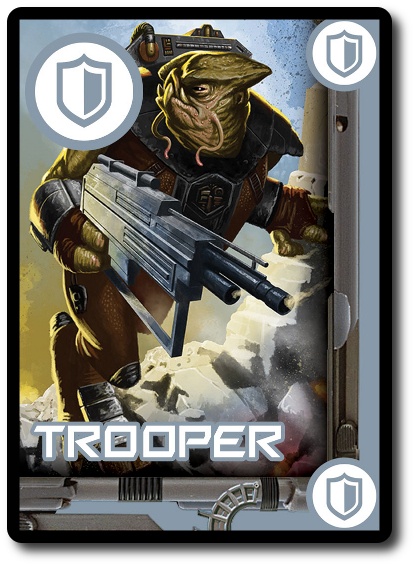
Step 3: Display Cards
This is an optional step. If the player likes, they can place one or more groups of collected cards down on the table in front of them. The number of type of cards in a group to be displayed depends on what the player is looking to collect.
Obviously, if a card is not available, it cannot be collected. The player is out of luck. When cards are used, they are discarded face-up into two different piles. One for Race and one for Technology.
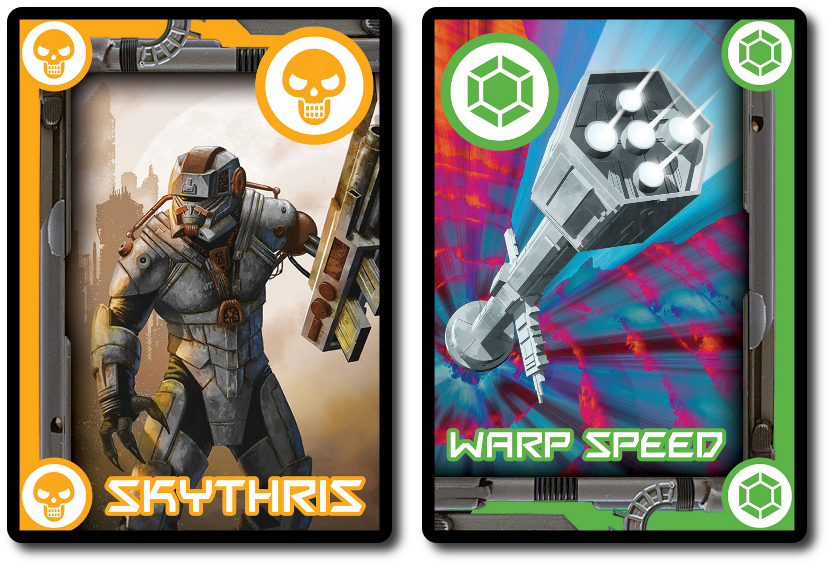
Example Race (left) and Technology (right) cards
Pilot cards are “wild cards” when displaying sets. They stand in for any Race card except the “Aturian” Race card. When used, they are not discarded, but are removed from the game.
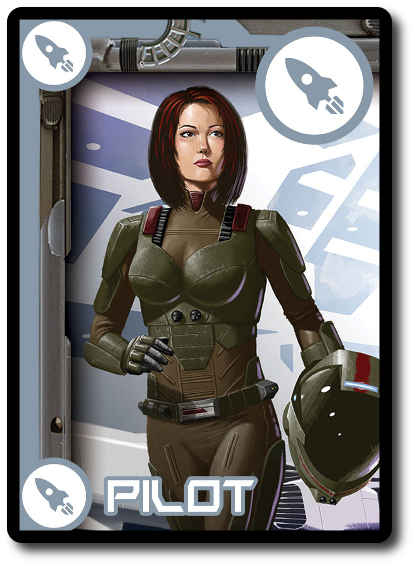
Collect Space Stations
Space Station cards require the player to display 5 identical Race cards. The displayed cards are discarded and the player takes the Space Station card from the Space Station pile. The “Aturian” Race cards cannot be used to collect Space Stations.
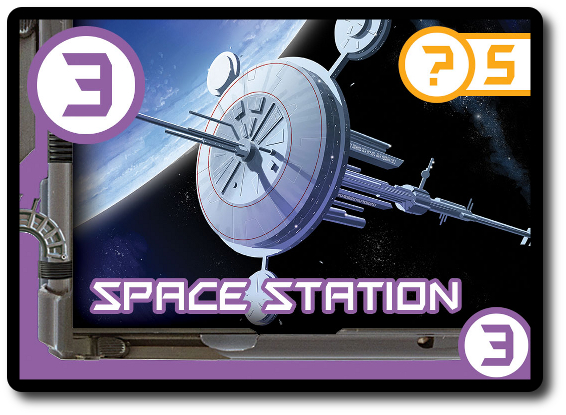
If the player had previously collected a University card, they only need to display 4 identical Race cards to collect a Space Station card.
Collect City Cards
City cards require the player to display 5 identical Technology cards. The displayed cards are discarded and the player takes the top-most City card from the City pile. The first City card collected is worth the most points, while the last City card is worth the fewest points. The “Cloning Facility” Technology card cannot be used to collect City cards.
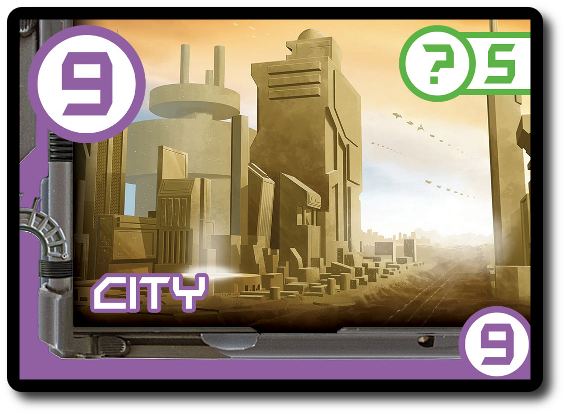
Collect Resort Cards
Resort cards require the player to display 3 “Aturian” Race cards. The displayed cards are discarded and the player takes the Resort card from the Resort pile.
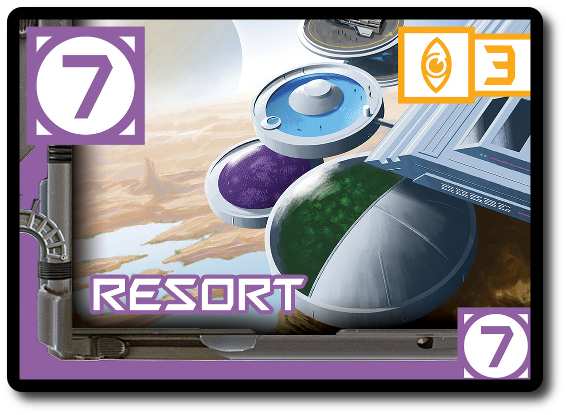
Collect University Cards
University cards require the player to display 3 “Cloning Facility” Technology cards. The displayed cards are discarded and the player takes the University card from the University pile.

Collect New Colony Cards
New Colony cards require the player to display 3 identical Race cards and 3 identical Technology cards. The displayed cards are discarded and the player takes the New Colony card.
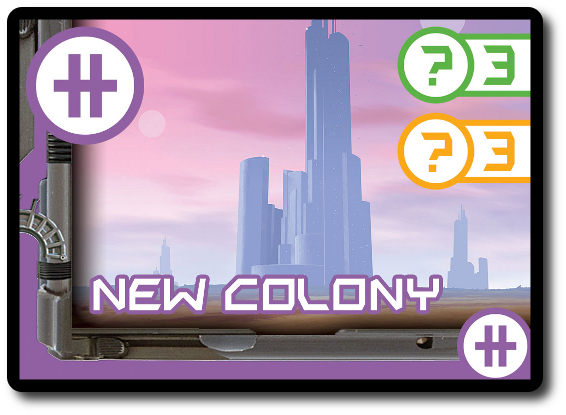
Fulfill Missions
The hot and dusty planet, Narkh Aduul, is of great interest to all the players. See “The Planet Narkh Aduul” for more information on how it can be won.
Step 4: Populate Hand
The last action the player takes is adding cards to their hand. The player draws 1 Race card (if any are available) and then draws 1 Technology card for each Space Station card in front of them. No more than 3 cards in total may be drawn, but the player can decide what cards to draw. For example, if the player can draw 3 cards, they can draw 1 Race and 2 Technology cards or 3 Technology cards.
This ends the player’s turn. The next player in turn order sequence now goes starting with step 1 noted above.
The Planet Narkh Aduul
Narkh Aduul is a hot and dry chunk of rock floating in space. It’s also a fantastic mining resource and currently being contested over by two opposing forces. This is where the players come in. They have been contracted out to assist in the mining or liberation of the planet, depending on how the player wants to look at it.
Each of the 4 Planet Narkh Aduul pieces represents a Mission. To complete a Mission, the player must build specific locations, display a specific number and type of cards, or perform specific actions. All of which are displayed using symbols that the Reference board describes.
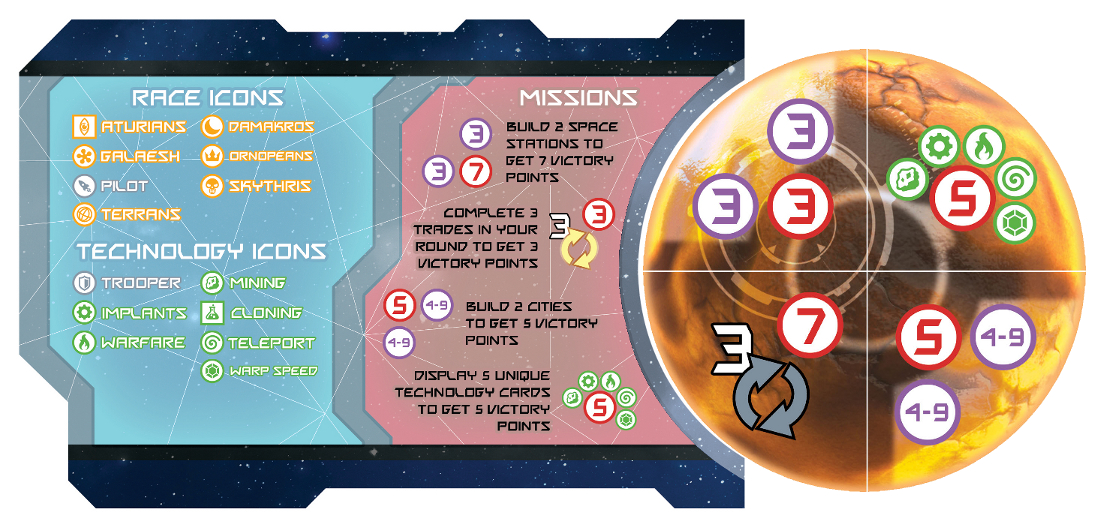
The Missions are as follows:
- Build 2 Space Stations
- Display 5 different Technology cards using all but the “Cloning Facility” Technology card
- Make 3 trades (use Trade tokens to help keep track of total Trades)
- Build 2 City cards
Into Oblivion
The game ends as soon as the last Technology card is drawn or when a player completes all 4 Missions for Planet Narkh Aduul.
All players now reveal their hands. In turn order sequence, any player who can build a Space Station or City can may now do so. When everyone has had a chance to build one more time, the final scoring takes place. You might want to give players a pen or pencil and a small sheet of paper to tally their scores.
- Total the values of all collected score cards (City, Space Stations, and Resorts)
- Total the values for completed Missions
- Earn 1 point for each pair of cards still in the player’s hand (2 “Cloning Facility” cards, for example)
- Earn 1 point for each Pilot or Trooper cards still in the player’s hand (these are not paired)
The player with the most points wins the game.
To learn more about Res Publica: 2230 AD, visit the game publisher’s website or visit the Kickstarter campaign.
Final Word
The Child Geeks quickly learned the game, finding the simple set collecting aspect to be intuitive and familiar. Where they struggled was the trading. According to one Child Geek, “The hardest part of this game is learning how to trade right. If you don’t listen to what cards are being asked for, you won’t know what is needed.” Another Child Geek quickly added, “And you have to know what cards you don’t want, so you can trade for better cards.” In short, the Child Geeks all felt that a player needed to have a plan to play Res Publica. For the younger and less experienced Child Geeks, this was a lesson they learned while playing, but it took 2 or more games for that lesson to sink in. When the last card was put away, the Child Geeks voted to approve Res Publica: 2230 AD, finding it to be a game that challenged and entertained without feeling like work.
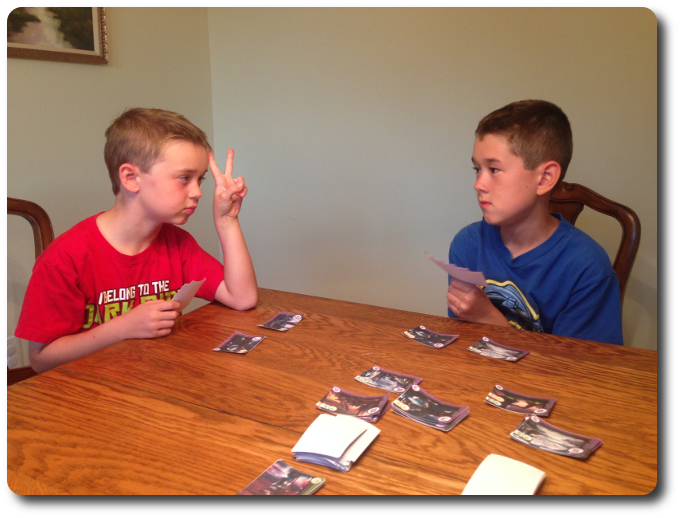
For my 8-year-old, the “art of trading” boiled down to: “I have what you want, so make me happy”
The Parent Geeks also enjoyed Res Publica: 2230 AD, finding the game to be a perfect mix of casual game play and player interaction. According to one Parent Geek, “I played the original version of this game and I liked it. I like this one, too, but this one feels a bit more streamlined.” Another Parent Geek said, “My favorite part is the trading, followed by completing locations. I think the game awards those players who pay attention and focus on collecting the right cards for the right builds.” The only aspect of the game the Parent Geeks didn’t like was Troopers and how they could disrupt a player’s turn. Then again, I didn’t observe any Parent Geek complaining about the Troopers when they used them to hinder an opponent. Regardless, the Parent Geeks all agreed that Res Publica: 2230 AD was a game worth playing with friends and family.
The Gamer Geeks found Res Publica to be very straight forward, but not to a point where they felt like they could sleepwalk through their turns. According to one Gamer Geek, “This game is very casual – almost too casual for me – but each turn is meaningful. You have to play close attention to what is being traded if you want to know what cards are available.” Another Gamer Geek said, “For me, this is the perfect filler game. Just the right mix of casual game play, fun, and critical thinking to make it worth my time.” The Gamer Geek’s ranged from “really enjoyed it” to finding it simply “OK”. None of the Gamer Geeks felt that Res Publica: 2230 AD was a deep or heavy game, but it did challenge the players to listen, think, and be as shrewd as possible. According to one Gamer Geek, “What made this game for me is the trading. If you don’t make good trades you’ll either be left in the cold or cheat yourself.” When all the games were over, the Gamer Geeks voted to approve Res Publica: 2230 AD.
What makes Res Publica: 2230 AD so inviting are the simple rules. What keeps players at the table is the restrictive trade etiquette that requires players to phrase requests and offers in a very specific way. There’s a game within the game here. Thematically speaking, the trading etiquette perfectly captures the complex negotiation between different alien races. How you ask is just as important as what you are asking for. This made every player pause and consider the essentials and not ask for too little or too much, as they attempted to make the best deal. Those players who attempted to cheat opponents quickly found their trades rejected, while those who attempted to reach fair deals had no problem finding trade partners.
Many of our players used special card abilities to hinder opponents, but the results were not in the player’s favor. Short term gains that caused opponent’s to stumble did long term damage to trade relations. All of our players really liked that. If you go and make another player angry, they won’t be going out of their way to deal with you. Which is not to say that opponents can avoid a player or create cabals. This means that an opponent, even those who don’t much care for the player, will eventually have to deal with them. Expect icy trade talks and abrupt language as Race and Technology cards exchange hands.
Res Publica: 2230 AD is a wonderful example of a gateway game. The light rules, easy to follow game play, and clearly communicated goals make it very accessible. The amount of critical thinking, planning, player interaction, light strategy, and tactics gives new players an opportunity to enjoy a game with multiple levels of game play and gaming veterans an experience full of meaningful choices. It’s the Goldilocks of Games, so to speak, being “just right” for all the players who sat down to play it with me.
I would recommend Res Publica: 2230 AD to anyone. It’s a great game to introduce and enjoy casually or as a way to start an evening of heavier games, but I’d stop short of suggesting it’s a heavy enough game for the most elite of elitist. Res Publica: 2230 AD will feel very rewarding to those who listen with sharp ears and can appreciate the value of a fair trade. For those who do not or care not to learn, Res Publica: 2230 AD can be surprisingly difficult. Victory is born from compromise and even enemies must be greeted as friends if the game is to be won. Do play Res Publica: 2230 AD when you have an opportunity.
This is a paid for review of the game’s final prototype. Although our time and focus was financially compensated, our words are our own. We’d need at least 10 million dollars before we started saying what other people wanted. Such is the statuesque and legendary integrity of Father Geek which cannot be bought except by those who own their own private islands and small countries.

